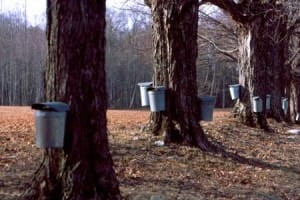Maple Sap and Overtime under the FLSA

The Fair Labor Standards Act, or “FLSA”, requires that employees be paid at least minimum wage for all hours worked, and at least one and one-half times their regular rate of pay for hours worked in excess of forty per week. However, the FLSA also has many exceptions to these rules, known as “exemptions.” Some of the exemptions excuse employers from paying minimum wage AND overtime to certain employees, which means that they can be paid an amount that ends up being less than minimum wage for all hours worked in a week when you do the math (for example, paying someone a salary of $475 and requiring them to work 70 hours per week, which would equate to $6.79 per hour total). Other exemptions mandate that an employee IS entitled to minimum wage for all hours worked, but that the employer does not have to pay one and one-half times the employee’s regular rate of pay for hours worked in excess of forty per week, known as overtime.
Some of the exemptions are better known that others, either because people are aware generally of the law or just because the practice is so common that it is generally understood by most people. For example, lawyers and medical doctors fall under the “professional” exemption and do not have to be paid minimum wage or overtime. Managers who supervise at least two full-time employees and have a primary duty of “management” usually fall under the “executive” exemption. Outside salespeople fall under the “outside sales” exemption. Some exemptions, however, are not as widely known. One of these lesser known exemptions applies to map sap processing.
According to Section 13(b)(15) of the Fair Labor Standards Act, “the provisions of section 207 of this title shall not apply with respect to any employee engaged in the processing of maple sap into sugar (other than refined sugar) or syrup.” What does this mean? Section 207 of the FLSA is entitled “Maximum Hours,” and it is the section that requires that one and one-half times an employee’s regular rate of pay be paid for hours worked in excess of forty per week, known as overtime. By saying this section does not apply, this regulation says that employees processing maple sap into sugar (other than refined sugar) or syrup are NOT entitled to overtime. They are still covered by section 206 of the FLSA, which means that they are entitled to at least minimum wage for all hours worked per week.
Michigan ranks 5th in the country for maple syrup production. Although this exemption may seem obscure, it does affect many people within the State of Michigan and limits their entitlement to overtime pay. However, maple sap processors ARE entitled to minimum wage for all hours worked, even though they do not get overtime pay for their overtime hours.
If you are a maple sap processor, or anyone else in Michigan, and believe that you are not being paid properly, call Gold Star Law to learn more about your rights to minimum wage and overtime.


